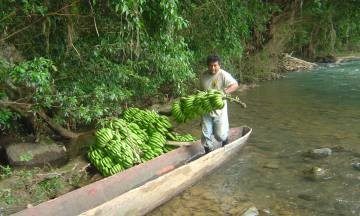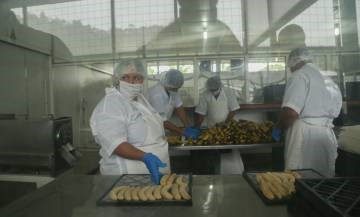Women have an important role in a producing company like APPTA. This fact, for one, doesn’t affect the participation of men who take part in both the production and decision-making process. This has broken paradigms in the population. “When you go to the meetings, more than 60% of attendees are women. Additionally, 37% of them are housewives. There are more women than men working in the important posts and that has always been a constant here” – said Juanita, one of the APPTA’s big cheese.
 WHAT IS APPTA: APPTA is a small producers association that was founded in 1987. Today, the association consists of 932 producers of which 80% are indigenous Bribri or Cabecar and 20% are black and white. 38% of the members of the association are women.
WHAT IS APPTA: APPTA is a small producers association that was founded in 1987. Today, the association consists of 932 producers of which 80% are indigenous Bribri or Cabecar and 20% are black and white. 38% of the members of the association are women.
We work with 55 different communities in the southern region of the Caribbean in Costa Rica, known as Talamanca. Specializing in organic agriculture and sustainable development, we provide tools for conservation and sources of income for the Talamancan people.
Inside the association facilities in Bribi Town, Beberly, a woman nicknamed Bebe, works on the cocoa grafts from which she expects monilia-resistant cocoa sprouts, a fungus that came to be a plague which ruined plantations throughout the past century. Neither the banana nor the plantain crops were safe from devastating diseases, driving a lot of foreign investors away from these Costa Rican farmlands.

“We are in a region that has been historically exploited. By the end of the 19th century, this site used to be a hub of the banana plantation. Two train stations that went from Limon to San Jose capital city were constructed by the United Fruit Company” – stated Walter Rodriguez. He also assured the company was given thousands of hectares to be cultivated with plantain which, by the same token, were going to be exported afterward.
Walter Rodriguez also explained that the worker’s situation was so terrible that for the company, a mule’s life was more valuable than a native’s or a farmer’s”. The croppers were dying from malaria and snake bites. That’s why the banana company laborers decided to carry out one of the biggest strikes in history in order to claim for medicines and changes in the payment method as they requested to get paid in cash because they used to receive coupons and bananas from the company instead of sound money.

Labor exploitation was a constant in the meantime that the foreign industry was ruling the zone. That didn’t change until the introduction of the Aboriginal law in 1977. The law seeks to protect and prevent the aboriginal territory from being sold and illegally taken away. There are thousands of ethnic groups living together in towns 10,000 of which belong to Bribri communities. Talamanca Bribri is a peaceful territory thanks to this law whereas Salitre is still a battlefield where the Bribri peoples are fighting to get rid of the white ranchers who usually intend to usurp their territories.
This background sheds light on why APPTA workers live in isolated communities, deep inside the rainforest and miles away from the Sixaola River. Hugo Valdés, an advisor of Cooperativas sin Fronteras, nicknames the area “the three storey paradise”.
